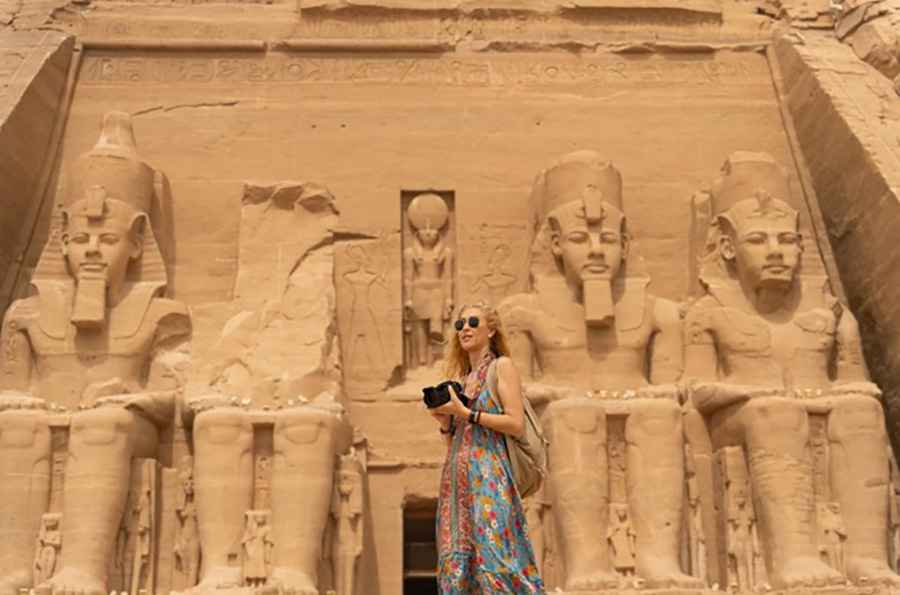Cultural encounters: Experiencing modern Egypt beyond the monuments
Why not explore and enjoy Egypt beyond the Pyramids and Sphinx? Egypt’s tourism is not limited to granite monuments and dunes. With its vast population, tourists can also immerse themselves in its vibrant streets, flavors, rhythms, and festivals.

Moreover, modern Egypt presents a perfect blend of pharaonic legacy with youthful innovation, offering hospitality that turns travelers into family. So, let’s explore Egypt tour packages and get lost in cultural encounters that reveal the true resilience, wit, and warmth.
The chaotic charm of Cairo's streets
The Khan el Khalili market in Cairo offers a preview of Egypt’s daily lifestyle. Walk through its 14th-century alleys, where silver merchants polish their wares, soak in the spice clouds that perfume the air alongside rhythmic tabla beats. Operating since 1773, enjoy the historic El Fishawy Café’s mint tea steams beside sweet sheesha clouds. Beside the Coptic Cairo stands the “hanging churches”, displaying 1,000-year-old icons, creating a fascinating contrast where teenage creators film against ancient walls. The true magic emerges when you learn to bargain the Egyptian way or during spontaneous interactions.
Savoring the street food symphony
The essence lies in savoring the Egyptian street food, which provides both sustenance and social connection with their culture. The renowned dish, Koshari, comes in a bowl with layers of rice, lentils, pasta, and chickpeas topped with crispy onions and garlicky tomato sauce, all for about $1. Next is Ta'amiya, Egypt's unique fava bean falafel, which bursts with herbaceous flavor inside warm eish baladi bread. There’s hawawshi for meat lovers, which are pita pockets filled with spiced beef, along with molokhia's savory jute-leaf soup. When in Aswan, you must try the Nubian families' flaky feteer pastries and ful medames. Exploring these food symphonies helps build bonds faster than words alone.
Grooving to mahraganat beats
Groove to the electrifying sounds of mahraganat ("festivals") music that defines the contemporary Egyptian youth culture. This distinct genre, which originated somewhere in Cairo, combines shaabi folk traditions with electronic beats and auto-tuned vocals. You can normally hear this even in the streets as tuk-tuk drivers blast these anthems at every red light. You can also visit Downtown Cairo bars or El Gouna's Sandbox Festival to experience these beats live, where traditional Sufi tanoura spinning meets modern bass drops. Immerse in the lyrics that speak of daily struggles and joys, demonstrating a powerful connection with young audiences navigating modern Egyptian life.
Festivals - Ancient roots, living joy
Egypt's festivals are celebrations that represent Pharaonic, Islamic, and Coptic traditions. If you land in Spring, you can attend the Sham Ennessim, a tradition of nationwide picnics featuring fesikh fish and dyed eggs. In February and October, there’s the Abu Simbel Festival, where you can watch sunlight illuminating Ramses II's inner sanctuary. Ramadan transforms nights into events of communal iftar meals. Last but not least, Christmas comes with fatta feasts. To get your timing right, we suggest getting tailored tour packages via Nile Cruise Vacation. This diversity demonstrates how shared celebrations with ancient roots unite Egypt's religious communities through color, music, and generosity.
Nubian warmth and desert oases
Be ready to be mesmerized by the rainbow-colored Nubian villages, located south of Aswan. Locals welcome visitors by draping scarves over shoulders, sharing generous home-cooked meals, tracing intricate henna patterns onto hands, and playing rhythmic tabla music in the background. This warm hospitality extends to rooftop stargazing in the evenings. In Siwa Oasis, witness Berber communities’ unique traditions where women create exquisite embroidery and narrate tales of Alexander the Great's visit to the ancient oracle. The slow-paced connections promote a restorative contrast to the urban energy.
Coffee culture and ahwas
The traditional ahwa or coffeehouse remains Egypt's social pulse. While ahwas are historically male-dominated, modern venues like Qahwa Heights are now open to diverse crowds. You can choose between thick Turkish qahwa with cardamom or vigorous sa'idi ginger brew. These aromatic spaces are witness to generations of nurtured poetry and protest. Therefore, spending an afternoon here would provide unparalleled insights into Egyptian social dynamics.
Felucca rides at sunset
A serene Nile cruise offers more than a journey—it’s a poetic connection to the river’s timeless rhythm. Gliding along the water, you’ll feel the gentle breeze and watch life unfold on the banks—fishermen casting their lines, children laughing in the shallows, and minarets glowing in the sunset. Between stops at Cairo’s skyline or Aswan’s lush botanical gardens, you’ll hear captivating tales from your local captain. This slow, soulful voyage lets you see Egypt as it has been for thousands of years—peaceful, enduring, and beautifully alive.
Hammams and self-care rituals
Have time for some self-care? Experiencing Egypt's bathing traditions is a once-in-a-lifetime opportunity; you cleanse alongside the community in spaces ranging from historic to contemporary. At Sultan Qalawun's 13th-century hammam, steam rises in marble domes as attendants use kessa gloves to exfoliate travel-weary skin. For more privacy, there’s the modern Heliopolis spas, which reinterpret Cleopatra's milk baths with rose oil infusions. These self-care rituals represent hygiene, where people can also converse and reframe their minds.
Crafting your Egyptian journey
Looking beyond renowned monumental sites, these cultural encounters await visitors seeking deeper connections. To live and immerse in the local Egyptian culture, you just need to find a well-curated tour package that integrates these authentic experiences. Alternatively, you can also find yourself a guide, allowing for open scheduling and spontaneous discoveries to bridge cultural gaps. So, open your heart and embrace the traditions.